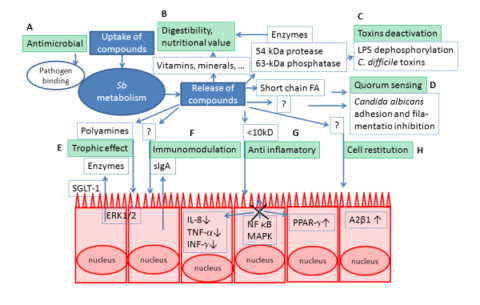
S. boulardii is a commonly recommended probiotic for a number of GI issues, especially diarrhea. This probiotic may also combat bacterial, parasite and fungal infections and support the human immune system. Read on to learn more about the science behind these benefits.
What is Saccharomyces boulardii?
Saccharomyces boulardii is a tropical species of yeast first isolated from lychee and mangosteen fruit in 1923. A French scientist (named Boulard, hence the scientific name of S. boulardii) first isolated this yeast after observing the natives of Southeast Asia chewing on the skin of lychee and mangosteen in an attempt to ward off cholera.
S. boulardii has been prescribed in the past 30 years for the prevention and treatment of diarrheal diseases caused by bacteria. Evidence suggests that this probiotic may be beneficial for IBD and IBS patients [1].
Potential Health Benefits
S. boulardii probiotics are in a unique position in terms of classification and approval. While they, like other probiotic supplements, are not approved by the FDA for any medical purpose or health claim, the FDA recognizes that doctors may use S. boulardii in a clinical setting. As such, special care has been advised when administering S. boulardii probiotics to patients who are ill and vulnerable to complications [2].
Talk to your doctor before using probiotics to ensure that you are not at risk for any potential complications.
Likely Effective For
1) Diarrhea
Formula with S. boulardii shortened diarrhea duration in infants and allowed quicker weight regain than a standard formula [3, 4].
S. boulardii significantly reduces the frequency and duration of acute diarrhea in children. This probiotic is well-tolerated [5, 6, 7, 8, 9, 10]. It also often reduces the length of ECU and hospital stay in acute infectious gastroenteritis in children [11, 12].
S. boulardii also decreases the duration and frequency of diarrhea, ameliorates abdominal pain in adults, and shortens the hospital stay in patients with acute infectious diarrhea [13, 14].
Some studies report that S. boulardii is not effective in preventing the development of antibiotic-associated diarrhea [15, 16, 17, 18]. However, many studies do, in fact, show that S. boulardii is effective in reducing the risk of antibiotic-associated diarrhea in both children and adults [19, 20, 21, 22, 23, 24, 25].
S. boulardii was also found to prevent traveler’s diarrhea, particularly in regions such as North Africa and in the Near-east [26].
S. boulardii is considered safe to administer to children who have acute diarrhea [27].
Possibly Effective For
2) Gut Health
IBS
S. boulardii improved the cytokine profile, histology, and quality of life of patients with diarrhea dominant irritable bowel syndrome (IBS-D) [28].
S. boulardii alone or with mesalazine improved IBS-D symptoms [29].
S. boulardii improved quality of life in patients with diarrhea-predominant IBS or mixed-type IBS [30].
One study, however, found no improvement in IBS-D patients after S. boulardii treatment [31].
Drug-induced GI Damage
S. boulardii significantly reduced the numbers of gastric ulcers and the ulceration surface of the gastric mucosa in rats treated with ibuprofen [32].
IBD
S. boulardii can be an effective addition in the treatment of patients with ulcerative colitis [33].
In association with doxycycline, it is effective in treating IBD in animal models, in which doxycycline is used to induce remission and long-term probiotic administration helps to prevent relapses [34].
S. boulardii treatment limits the infiltration of Th1 cells into the inflamed colon and inhibits proinflammatory cytokine production in mice with IBD [35].
It suppresses colitis and pro-inflammatory cytokine production and decreases tissue NO levels in rats [36, 37].
S. boulardii reduces inflammation and intestinal colonization by C. albicans in mice with colitis [38].
Crohn’s Disease
S. boulardii added to baseline therapy improved intestinal permeability in Crohn’s disease (CD) patients, even though complete normalization was not achieved [39].
In addition to the basic treatment, it reduced the frequency of bowel movements in CD patients [40].
GI Inflammation
S. boulardii reduced inflammation and dysfunction of the gastrointestinal tract in mice with intestinal mucositis [41].
S. boulardii inhibited C. difficile toxin A-associated enteritis and protected against intestinal inflammation in mice [42].
2) H. pylori Infection
S. boulardii had a positive effect on reducing the colonization of H. pylori in the human gastrointestinal system, but was not able to eradicate infection when used as single therapy [43].
In patients with H. pylori infection, S. boulardii along with standard triple therapy increased eradication rates and decreased overall therapy-related side effects, particularly diarrhea [44, 45, 46, 47, 48, 49].
S. boulardii administered in addition to proton pump inhibitor-based triple therapy non-significantly lowered the incidence of nausea, vomiting, and abdominal pain and significantly lowered the incidence of stomatitis, constipation, and diarrhea in infected children [50].
S. boulardii improved anti-H. pylori therapy-associated diarrhea, epigastric discomfort, and treatment tolerability. In addition, S. boulardii decreased post-treatment dyspepsia symptoms independent of H. pylori status [51].
3) Bacterial, Parasitic, and Fungal Infections
S. boulardii reduced E. coli numbers in children [52].
S. boulardii suppressed B. hominis infection in children as efficiently as metronidazole [53].
S. boulardii also effectively improved giardiasis when combined with metronidazole therapy in adult patients [54].
The addition of S. boulardii to metronidazole in amebiasis significantly decreases the duration of (bloody) diarrhea and enhances clearance of cysts in children, and decreases the duration of symptoms and cyst passage in adults [55, 56].
One study, however, found no benefit of S. boulardii in amebiasis [57].
S. boulardii increased survival rate, protected against liver damage and inhibited the translocation of bacteria in mice infected with typhoid fever (Salmonella enterica Typhimurium) [58].
In cells, S. boulardii decreases C. albicans adhesion and reduces cytokine-mediated inflammatory host response [59].
In a study of preterm infants, prophylactic S. boulardii supplementation was as effective as nystatin in reducing fungal colonization and invasive fungal infection and more effective in reducing the incidence of clinical sepsis and the number of sepsis attacks. It also had a favorable effect on feeding intolerance in very low birth weight infants [60].
4) Immunity
http://www.intechopen.com/books/probiotics/saccharomyces-cerevisiae-var-boulardii-probiotic-yeast
S. boulardii enhanced the immune response in a study of children with pediatric acute gastroenteritis [61].
Oral treatment with viable or heat-killed cells of S. boulardii maintained the intestinal integrity and modulates the immune system in mice, preventing bacterial translocation and intestinal lesions [62].
In HIV Patients
Treatment with S. boulardii decreased microbial translocation (LBP) and inflammation parameters in HIV-1-infected patients with long-term virologic suppression [63].
Insufficient Evidence For
Researchers are currently investigating whether S. boulardii has other health benefits. The potential benefits in this section have produced positive results in at least one clinical trial, but these studies are small, contradictory, or otherwise limited. Talk to your doctor before supplementing with S. boulardii for any reason.
5) Feeding Tolerance in Infants
Prophylactic supplementation of S. boulardii improved weight gain and feeding tolerance and had no adverse effects in preterm infants over 30 weeks old [64].
Orally administered S. boulardii reduced feeding intolerance and clinical sepsis in very-low-birth-weight (VLBW) infants [65].
6) Cardiovascular Disease
In a small study of 12 patients, daily supplementation with S. boulardii lowered remnant lipoprotein in hypercholesterolemic adults, a predictive biomarker and potential therapeutic target in the treatment and prevention of coronary artery disease [66].
Animal and Cell Studies (Lacking Evidence)
No clinical evidence supports the use of S. boulardii for any of the conditions listed in this section. Below is a summary of the existing animal and cell-based research, which should guide further investigational efforts. However, the studies listed below should not be interpreted as supportive of any health benefit.
7) Diabetes and Obesity
S. boulardii induced dramatic changes in gut microbiota, reduced body weight and fat mass and improved hepatic steatosis and inflammatory tone in obese and type 2 diabetic mice [67].
8) Liver Health
S. boulardii promoted liver function and slowed down the progress of liver fibrosis in rats [68].
S. boulardii effectively prevented liver injury induced by Salmonella Enteritidis infection in mice [69].
S. boulardii ameliorated intestinal injury and the accompanying liver inflammation by supporting the antioxidant state of the tissues and by inhibiting the recruitment of neutrophils [70].
Mechanism of Action
- Decreases pro-inflammatory cytokines TNF-α [41, 36, 71, 38, 28], IL-1β [41, 42, 72] and IL-6 [71, 63].
- Decreases IL-8 [36, 42, 72, 28, 59] [with a handful of exceptions, including: 71].
- Increases the anti-inflammatory cytokine IL-10 [62, 28, 73] [in some tissues IL-10 may be decreased: 73].
- Can both increase [74] and decrease [68] TGF-beta.
- Can both decrease [38] and increases IFN-γ [73].
- Increases IgA [62, 61], can increase CD8 lymphocytes [61] and TLR2 and TLR4 [38].
- Increases GSH [70].
- Decreases CXCL1 [41], CRP [61] and NF-kappaB [36, 72].
- Can both increase and decrease PPAR-γ [36, 1].
- Decreases COL1A1, αSMA, AST, ALT, and MDA [68].
Safety
S. boulardii is safe for use in otherwise healthy populations and was even shown to be safe in patients infected with HIV-1. That being said, if you are ill or if you have a suppressed immune system, we strongly recommend talking to your doctor before using probiotics [63].
Fungemia is a rare but serious complication of treatment with S. boulardii, and this probiotic should be taken with care or avoided in immunocompromised patients [75].


